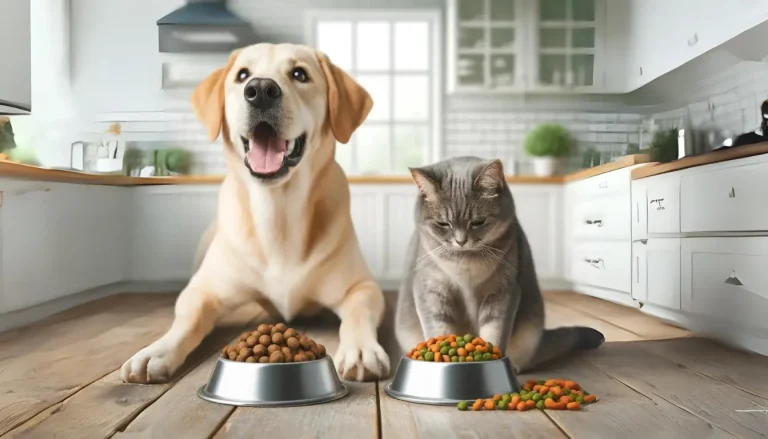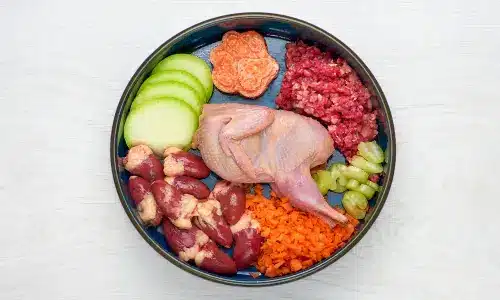Understanding Pet Poisoning Risks
Keeping your beloved pets safe requires more than just love and affection—it also demands vigilance about what they eat. Many common household foods that are harmless to humans can be toxic foods for pets. Pet poisoning from these foods is more common than many owners realize, leading to emergency vet visits and, in severe cases, life-threatening conditions. Understanding which foods are harmful and how to prevent accidental ingestion is crucial for every pet owner.
Awareness is the first step in preventing pet poisoning. By knowing which foods are toxic and recognizing the symptoms of poisoning, you can act quickly to protect your furry friends. This blog will guide you through the most common toxic foods for dogs and cats, explain why these foods are dangerous, and provide practical tips for preventing accidental poisoning. Let’s ensure that our pets stay healthy and safe by avoiding these harmful foods and staying informed.
Common Toxic Foods for Dogs
Chocolate
Chocolate is one of the most well-known toxic foods for dogs. It contains theobromine, a compound that dogs metabolize much more slowly than humans. Even small amounts of chocolate can cause vomiting, diarrhea, rapid breathing, increased heart rate, and seizures in dogs. Dark chocolate and baking chocolate are particularly dangerous due to their higher theobromine content.
Grapes and Raisins
Grapes and raisins, though healthy for humans, can be extremely toxic to dogs. Even a small quantity can lead to severe kidney damage. Symptoms of poisoning include vomiting, lethargy, and depression. The exact substance in grapes and raisins that causes toxicity is still unknown, but it’s clear that even small amounts can be dangerous.
Onions and Garlic
Onions and garlic, whether raw, cooked, or powdered, are harmful to dogs. They contain compounds that can damage red blood cells, leading to hemolytic anemia. Symptoms include weakness, vomiting, breathlessness, and a reddish tint to urine. Garlic is even more potent than onions, making it particularly dangerous in smaller doses.
Alcohol
Alcohol can be highly toxic to dogs, causing rapid drops in blood sugar, blood pressure, and body temperature. Even small amounts of alcohol, whether in drinks or in foods like unbaked dough, can lead to vomiting, diarrhea, lack of coordination, difficulty breathing, and, in severe cases, coma or death. Never let your dog consume alcohol or foods containing alcohol.
Caffeine
Caffeine, found in coffee, tea, energy drinks, and certain medications, is another substance that dogs should never consume. It stimulates the central nervous system and can cause symptoms such as restlessness, rapid breathing, heart palpitations, muscle tremors, and seizures. Caffeine toxicity can be life-threatening, so it’s important to keep all caffeinated products out of your dog’s reach.
By being aware of these common toxic foods for pets, you can take steps to prevent your dog from accidentally ingesting them. Keep these foods securely stored away and ensure that everyone in your household is aware of the dangers they pose to your furry friend.

Common Toxic Foods for Cats
Chocolate
Just like for dogs, chocolate is extremely toxic to cats. It contains theobromine and caffeine, both of which cats metabolize very slowly. Even small amounts can cause symptoms such as vomiting, diarrhea, increased heart rate, seizures, and in severe cases, death. Dark chocolate and baking chocolate have higher concentrations of these toxic compounds and are especially dangerous.
Onions and Garlic
Onions and garlic can cause significant harm to cats. These foods contain compounds that can damage cats’ red blood cells, leading to a condition known as hemolytic anemia. Whether raw, cooked, or in powdered form, even small amounts can cause lethargy, weakness, vomiting, and breathlessness. Garlic is particularly potent and can cause severe toxicity even in small doses.
Alcohol
Alcohol is highly toxic to cats, even in very small quantities. It can cause a rapid decrease in blood sugar, blood pressure, and body temperature. Symptoms of alcohol poisoning include vomiting, diarrhea, lack of coordination, difficulty breathing, and in severe cases, coma or death. It’s crucial to ensure that your cat never has access to alcoholic beverages or foods containing alcohol.
Caffeine
Caffeine, found in coffee, tea, energy drinks, and some medications, is another dangerous substance for cats. It stimulates the central nervous system and can lead to symptoms such as restlessness, rapid breathing, heart palpitations, muscle tremors, and seizures. Caffeine poisoning can be fatal, so it’s essential to keep all caffeinated products well out of reach of your cat.
Raw Fish and Eggs
While it might seem natural to feed cats raw fish or eggs, these foods can be harmful. Raw fish contains an enzyme called thiaminase, which can destroy thiamine (vitamin B1) in cats, leading to neurological problems. Raw eggs pose a risk of salmonella or E. coli infection, which can cause vomiting, diarrhea, and lethargy. Additionally, raw egg whites contain avidin, which can interfere with the absorption of biotin (a B vitamin), leading to skin and coat problems.
Understanding these common toxic foods for pets can help you take necessary precautions to keep your feline friend safe. Always store these foods securely and ensure that your cat’s diet is free from these harmful substances.
Why These Foods Are Harmful
Explanation of How These Foods Affect Dogs and Cats
Many foods that are harmless or even beneficial for humans can be toxic to dogs and cats due to differences in metabolism and physiology. Here’s how some of these common toxic foods affect our pets:
- Chocolate: Contains theobromine and caffeine, which stimulate the heart and nervous system. Dogs and cats metabolize these compounds much more slowly than humans, leading to toxic buildup and severe health issues.
- Grapes and Raisins: The exact toxin is unknown, but ingestion can cause rapid kidney failure in dogs, leading to a buildup of waste products in the blood.
- Onions and Garlic: These foods contain thiosulfates, which can damage red blood cells and lead to hemolytic anemia in both dogs and cats. This condition reduces the blood’s ability to carry oxygen, causing severe health issues.
- Alcohol: Rapidly affects the central nervous system, liver, and kidneys. Pets are much smaller than humans and more sensitive to alcohol, leading to life-threatening drops in blood sugar, blood pressure, and body temperature.
- Caffeine: Found in coffee, tea, and many sodas and energy drinks, caffeine is a potent stimulant that can cause hyperactivity, increased heart rate, and seizures in pets.
- Raw Fish and Eggs: Raw fish contains thiaminase, which destroys thiamine (vitamin B1), essential for nervous system function. Raw eggs can contain salmonella or E. coli, leading to serious gastrointestinal issues and infections.
Symptoms of Poisoning
Recognizing the symptoms of poisoning can be crucial for timely intervention. Here are common signs to look out for if your pet ingests a toxic food:
- Chocolate Poisoning: Vomiting, diarrhea, rapid breathing, increased heart rate, seizures, and tremors.
- Grapes and Raisins Poisoning: Vomiting, lethargy, abdominal pain, decreased appetite, and signs of kidney failure such as increased thirst and urination.
- Onions and Garlic Poisoning: Weakness, lethargy, pale gums, reddish urine, vomiting, and diarrhea.
- Alcohol Poisoning: Vomiting, diarrhea, lack of coordination, slowed breathing, tremors, abnormal body temperature, and in severe cases, coma or death.
- Caffeine Poisoning: Restlessness, rapid breathing, heart palpitations, muscle tremors, seizures, and elevated body temperature.
- Raw Fish and Eggs Poisoning: Vomiting, diarrhea, lethargy, loss of appetite, and in severe cases of thiamine deficiency, neurological symptoms like seizures and muscle weakness.
Understanding why these foods are harmful and recognizing the symptoms of poisoning can help you act quickly to protect your pets. Always keep these toxic foods out of reach and ensure your pet’s diet is safe and healthy.

What to Do If Your Pet Ingests Toxic Food
Immediate Steps to Take
If you suspect or know that your pet has ingested toxic foods for pets, it’s important to act quickly:
- Stay Calm: Panic can make it difficult to think clearly and act effectively. Take a deep breath and focus on the steps you need to take.
- Remove Access: Immediately remove any remaining toxic food from your pet’s reach to prevent further ingestion.
- Check for Symptoms: Observe your pet for any signs of poisoning such as vomiting, diarrhea, lethargy, difficulty breathing, or seizures.
- Gather Information: Note the type of food ingested, the amount, and the time of ingestion. This information will be crucial for your veterinarian.
When to Contact a Veterinarian
It is always best to err on the side of caution when dealing with potential pet poisoning:
- Immediate Contact: Call your veterinarian or an emergency animal clinic immediately if you suspect your pet has ingested a toxic substance. Even if your pet is not showing symptoms yet, some toxins can take time to manifest.
- Poison Control Hotlines: In the United States, you can also contact the ASPCA Animal Poison Control Center at (888) 426-4435 or the Pet Poison Helpline at (855) 764-7661 for immediate advice and assistance.
- Veterinary Visit: If advised by a professional, take your pet to the veterinarian immediately. Bring any packaging or information about the ingested food with you.
Home Remedies to Avoid
When it comes to pet poisoning, some well-meaning but misguided home remedies can do more harm than good:
- Inducing Vomiting: Never induce vomiting unless explicitly instructed by a veterinarian. Some substances can cause more damage coming back up, and improper techniques can harm your pet.
- Administering Human Medications: Never give your pet human medications like aspirin, ibuprofen, or activated charcoal without veterinary guidance. These can be toxic and worsen the situation.
- Waiting for Symptoms: Do not wait for symptoms to appear before seeking help. Some toxins act quickly, and delays can be fatal.
- Using Food or Drinks: Avoid giving your pet food, water, or milk as a remedy. Certain substances might interact negatively with the ingested toxin, complicating treatment.
Prompt action and professional guidance are crucial when dealing with potential poisoning. By following these steps, you can ensure the best possible outcome for your pet and avoid the dangers of incorrect home remedies.
FAQs about Toxic Foods for Pets
Common Questions and Answers
Q: What should I do if my pet eats chocolate? A: Contact your veterinarian immediately. Chocolate contains theobromine, which is toxic to pets. They can advise you on the next steps based on the amount ingested and your pet’s size.
Q: Are there any safe alternatives to grapes for my dog? A: Yes, fruits like apples (without seeds), blueberries, and bananas are safe and healthy alternatives.
Q: Can a small amount of onion or garlic harm my pet? A: Yes, even small amounts can be toxic. Onions and garlic damage red blood cells and can cause anemia.
Q: How can I prevent my pet from ingesting toxic foods? A: Store toxic foods out of reach, educate family members about the dangers, and supervise your pet during meals.
Keeping Your Pets Safe
Protecting your pets from toxic foods is a crucial aspect of responsible pet ownership. Avoiding harmful foods like chocolate, grapes, onions, and others we’ve discussed can prevent severe health issues and emergencies. By being informed about the dangers and symptoms of pet poisoning, you can act swiftly and effectively if an incident occurs.
Stay vigilant by keeping toxic foods out of your pets’ reach and educating family members and visitors about the risks. Regularly review and update your knowledge on pet safety to ensure your furry friends lead happy, healthy lives. Your proactive efforts in preventing exposure to toxic foods are vital in maintaining the well-being and safety of your beloved pets.
For more information and tips for care of your pets visit our Blog

